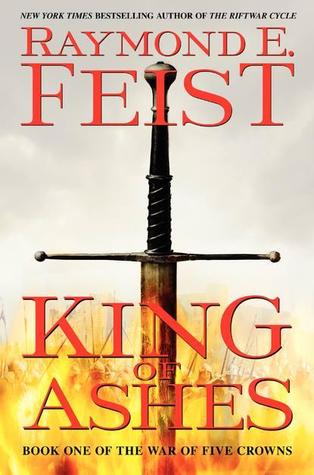 King of Ashes (Firemane, #1) by Raymond E. Feist
King of Ashes (Firemane, #1) by Raymond E. Feist Format: eARC
Source: supplied by publisher via Edelweiss
Formats available: hardcover, paperback, large print, ebook, audiobook
Genres: epic fantasy
Series: Firemane #1
Pages: 512
Published by Harper Voyager on May 8, 2018
Purchasing Info: Author's Website, Publisher's Website, Amazon, Barnes & Noble, Kobo, Bookshop.org
Goodreads
The first volume in legendary master and New York Times bestselling author Raymond E. Feist’s epic heroic fantasy series, The Firemane Saga—an electrifying tale of two young men whose choices will determine a world’s destiny.
For centuries, the five greatest kingdoms of North and South Tembria, twin continents on the world of Garn, have coexisted in peace. But the balance of power is destroyed when four of the kingdoms violate an ancient covenant and betray the fifth: Ithrace, the Kingdom of Flames, ruled by Steveren Langene, known as "the Firemane" for his brilliant red hair. As war engulfs the world, Ithrace is destroyed and the Greater Realms of Tembria are thrust into a dangerous struggle for supremacy.As a Free Lord, Baron Daylon Dumarch owes allegiance to no king. When an abandoned infant is found hidden in Daylon’s pavilion, he realizes that the child must be the missing heir of the slain Steveren. The boy is valuable—and vulnerable. A cunning and patient man, Daylon decides to keep the baby’s existence secret, and sends him to be raised on the Island of Coaltachin, home of the so-called Kingdom of Night, where the powerful and lethal Nocusara, the "Hidden Warriors," legendary assassins and spies, are trained.
Years later, another orphan of mysterious provenance, a young man named Declan, earns his Masters rank as a weapons smith. Blessed with intelligence and skill, he unlocks the secret to forging King’s Steel, the apex of a weapon maker’s trade known by very few. Yet this precious knowledge is also deadly, and Declan is forced to leave his home to safeguard his life. Landing in Lord Daylon’s provinces, he hopes to start anew.
Soon, the two young men—an unknowing rightful heir to a throne and a brilliantly talented young swordsmith—will discover that their fates, and that of Garn, are entwined. The legendary, long-ago War of Betrayal has never truly ended . . . and they must discover the secret of who truly threatens their world.
My Review:
It takes a very special kind of magic to capture lightning in a bottle. Magician had just that kind of magic, but that was a long time ago and world away from Firemane and King of Ashes. In the intervening decades (Magician was originally published in 1982!) the author has been prolific, but all of the books he has written since Magician have been set in Midkemia, the world he created with Magician, with the exception of the standalone Faerie Tale in 1988.
Magician looms very large in my memory. I still have my original copy, a 1982 Science Fiction Book Club edition. I picked up King of Ashes because I wondered if the author had managed to magic that lightning into the bottle again, in this first book in a completely new series that does not hearken back to Midkemia.
King of Ashes begins with a bang. Not quite literally, more like a thwack. That thwack is the sound the headsman’s axe makes when it severs the neck of the last king of Ithrace, Steveren Langene. But Langene’s real cause of death wasn’t the axe – the axe was just the instrument. Truly, he died of betrayal.
Langene’s line, the line of the Firemane, was supposed to have died on that scaffold. It certainly looked like it did, as his wife and all his children were killed before him. But as two of his former barons speculate while standing in the crowd of watchers, there are rumors of a baby, one born not long before this terrible campaign began.
Of course those rumors are true, as one of the barons soon discovers. So even though he couldn’t save his friend without dooming his own people, Baron Dumarch does what he can to save his friend’s only remaining child. He conceals the boy, not in his own household, but in the hidden kingdom of Coaltachin, the country of assassins.
The story in King of Ashes is the story of the coming of age of young Hatushaly who knows that he is different, and not just because of his copper-red hair in a kingdom of mostly dark-haired people. He is raised the same as the masters’ sons, but he knows he will never become a master himself. He feels that he is being protected, even as he undergoes the same grueling training as all children in the Invisible Nation.
He learns to hide, he learns to hunt, he learns to kill. He learns how to lead, how to follow, when to question and when to obey without question. He learns to control the fire inside him, without ever knowing what it is, why it is there, or who he really is. And he learns to control his own anger that secrets are being kept from him that he absolutely needs to know.
When all is finally revealed, he understands everything, but not nearly enough. And his story has only just begun.
Escape Rating A: In answer to the question of whether the author has managed to capture that lightning in the bottle again, the answer is yes. Perhaps not quite as full a bottle as Magician, but nevertheless, the bottle sparks with more than enough magic to make King of Ashes a marvelous read for any epic fantasy lover.
In the best epic fantasy tradition, King of Ashes is a coming of age story. We first meet Hatu as a baby, but the story then fast forwards to Hatu as a young man, nearing the end of his training in the Invisible Nation and learning to master himself and his power.
But it is not just Hatu’s coming of age, and that’s part of what makes the book so good. In spite of their training, Hatu has two friends who stand with him through thick and thin, the master’s grandson Donte and the farmer’s daughter Hava. Together they are the three best students of their year, and it seems as if together they will change their world. If they don’t manage to kill each other first.
It is also, and on the other side of the world, the story of Declan, an young journeyman smith, who gains his mastery and sets out to make his own fortune as the story begins. While Hatu’s training and early missions are fascinating, Declan’s rise from journeyman to master and leader is totally different but equally compelling.
The story switches from one point of view to the other as they are slowly but inexorably drawn together, but the reader is never confused who they are following or what they are witnessing – and why.
I don’t want to give the game away, so I’m trying not to add spoilers, and it’s very hard. This book was pretty damn awesome. The only reason I didn’t finish it in one day (all 500 pages of it!) is that about 2 am I just couldn’t keep my eyes open anymore, no matter how much I wanted to. I finished at breakfast the next morning because I just couldn’t stop.
There are elements of other epic fantasies, because these are classic tropes. The hidden prince story goes all the way back to King Arthur and the story of Excalibur in the stone. For a more contemporary parallel, the Codex Alera by Jim Butcher also has a similar feel. The loss and destruction of Ithrace has parallels to Guy Gavriel Kay’s Tigana, but that seam has also been mined time and again. The hidden kingdom of assassins also has its parallels in Jon Courtenay Grimwood’s Assassini and even in the assassin kingdom of Antiva in the Dragon Age video game series.
But putting those elements together with Declan’s considerably more prosaic but still fascinating transition from journeyman to master to leader makes for a magically tasty read. I am also happy to say that although the focus is on Hatu, Hava’s story arc is not reduced to merely sidekick/love interest. It is clear from the very beginning that she is going to be a mover and shaker in this story in her own right as it continues.
And there’s the rub. Unlike Magician, King of Ashes is far from a finished arc for these characters. As the Baron Dumarch puts it, this is only the first chapter, and it is a long game for him and a long first chapter for readers, albeit a very satisfying one.
The author appears to be committing trilogy, with the succeeding volumes very tentatively titled King of Embers and King of Flames. And I can’t wait.

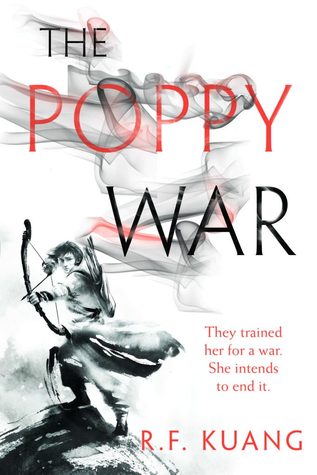 The Poppy War by
The Poppy War by 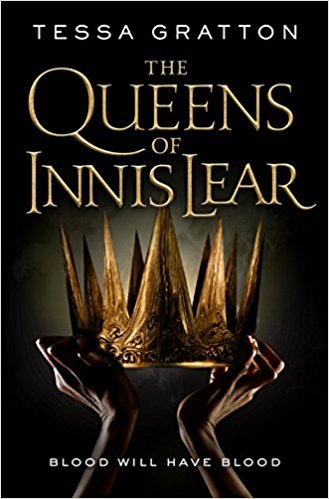 The Queens of Innis Lear by
The Queens of Innis Lear by 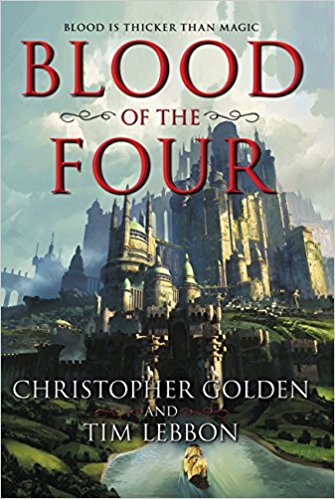 Blood of the Four by
Blood of the Four by 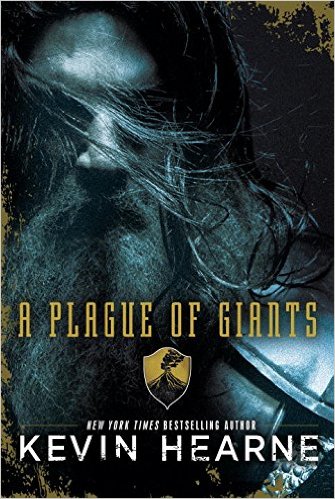 A Plague of Giants by
A Plague of Giants by 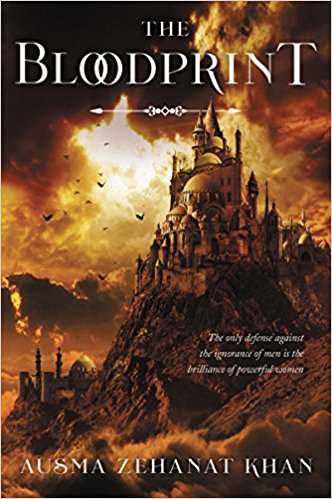 The Bloodprint (The Khorasan Archives #1) by
The Bloodprint (The Khorasan Archives #1) by 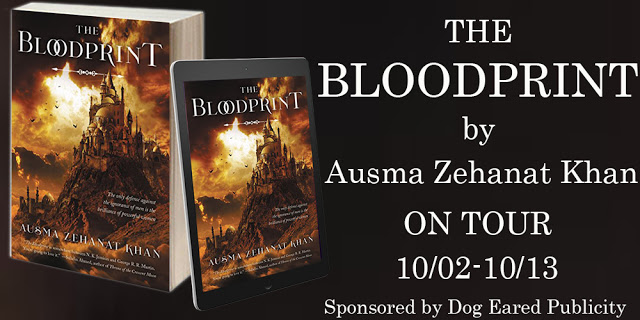
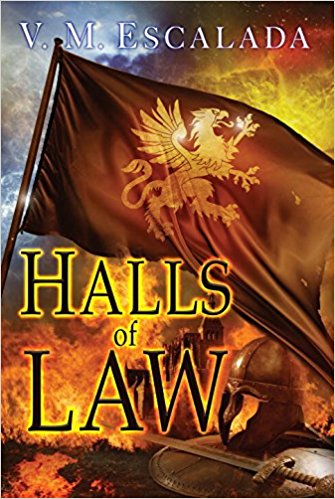 Halls of Law by
Halls of Law by 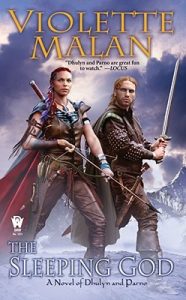 Reviewer’s Note: V.M. Escalada was billed as a debut author in the material I received for my Library Journal Science Fiction and Fantasy article,
Reviewer’s Note: V.M. Escalada was billed as a debut author in the material I received for my Library Journal Science Fiction and Fantasy article,